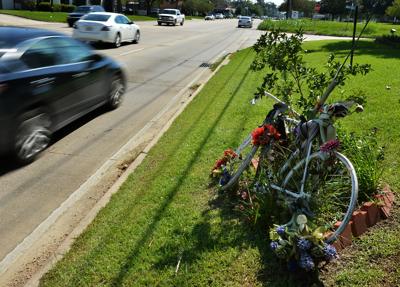After two bicyclists were struck and killed by cars in Baton Rouge this week, local cycling advocates have spoken out about a lack of bicycle-friendly infrastructure and dangerous driving that endanger both pedestrians and cyclists.
Ronney Thomas, 41, of Baton Rouge, was killed Thursday evening in the 400 block of West Grant Street near Highland Road when a 2009 Chevrolet Impala struck his bicycle.
Then, Friday morning, 32-year-old Brandy Zeringue, a homeless woman, was hit by a 2005 Jeep Liberty as she was attempting to cross the street on her bicycle in the 1200 block of North Boulevard.
Baton Rouge Police spokesman Sgt. L’Jean McKneely Jr. said both crashes are under investigation and no one has been arrested in either incident.
Bicycle safety has been an urgent issue for a number of years, but especially after East Baton Rouge Metro Council member Anthony "Buddy" Amoroso was struck and killed by an SUV while cycling in West Feliciana Parish in June 2018.
Statistics point to troubling trends in the state’s bicycle safety report card. An analysis by the Wall Street Journal from 2018 found that Louisiana is ranked No. 2 nationally in bicyclist deaths, just behind Florida. And data over the last five years from the Highway Safety Research Group at LSU show that bicycle deaths across the state have generally been on an uptick.
Police have identified the cyclist who was fatally struck by a vehicle Thursday evening off Highland Road, Baton Rouge Police spokesman Sgt. L…
Advocates, such as leaders of the local nonprofit Bike Baton Rouge, say that while practicing bike safety is always beneficial, changing the city’s infrastructure is the only fail-safe method to protect cyclists from getting hit by cars or trucks.
“We’re never going to be an Amsterdam,” said Bike Baton Rouge President Mika Torkkola. “But we can have realistic goals.”
Torkkola said Baton Rouge should focus on decreasing vehicle and bicycle interaction in areas where cyclists frequent, such as Highland Road, a high-traffic area near LSU that's dotted with student bikes.
The nonprofit will host a memorial ride next Wednesday for cyclists to travel from North Boulevard to West Grant Street in honor of the victims. Torkkola said he imagines “ghost bicycles” – painted white and placed at the sites where cyclists have died in crashes – will likely appear at each location in the coming days.
Doug Moore, vice president of Bike Baton Rouge, pointed out that in many ways Baton Rouge could be the perfect city to bike and walk. But certain elements prevent residents from making the most of their city.
“We have mild winters, flat terrain, lots of beautiful trees, nice old, historic neighborhoods,” Moore said. “The problem is those areas are hemmed in by roads that are designed as if they’re rural highways running through dense, urban neighborhoods.”
Moore emphasized that education, cultural acceptance of biking, and designing roads with cyclists in mind are ways the city can improve on bike safety.
Speed, Moore added, is another factor. In a city where he feels too many drivers aggressively exceed the posted speed limit, he said he does not see law enforcement strongly addressing the issue.
McKneely, the Baton Rouge Police spokesman, said the agency's traffic division spends a lot of time trying to catch speeders, often responding to complaints in particular areas where drivers tend to push the limit.
Stanford Avenue near LSU, Highland Road at Kenilworth Parkway, Greenwell Springs Road in front of Capitol Middle School, Jefferson Avenue at North Foster Drive, the 9500 block of Hyacinth Avenue, and Jefferson Highway at Airline Highway are just a few hot-spots where police regularly send out patrol officers with radar guns, he said.
Bike Baton Rouge has placed some of its hope in the East Baton Rouge Pedestrian and Bicyclist Master Plan, which was launched in 2018. The project, led by the Louisiana Department of Transportation and Development and BREC, aims to create a network of pedestrian and bicycle-friendly pathways across the parish.
A homeless woman was killed in a traffic crash Friday morning while trying to cross the road on her bicycle, Baton Rouge Police spokesman Sgt.…
This vision of an interconnected Baton Rouge also promotes a coexistence between bicyclists and drivers.
“The most common insult you get hurled at you when you’re on a bike is, ‘Get off the road,’” Torkkola said. “And my reaction always is, ‘I would love to. Help me do this.’”




